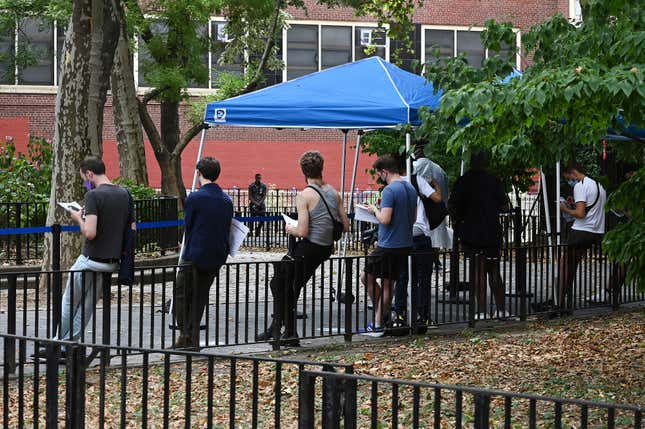Misinformation Is Worsening the Monkeypox Crisis and Fueling Homophobia
Inaccurate framing of the disease puts queer people at risk—on top of the government's slow and damaging response.
Health

Photo:AP (AP)
As of Tuesday, there were roughly 2,600 reported monkeypox cases in 44 states—at least that we know of. This number has more than doubled in the last two weeks, and the World Health Organization over the weekend declared monkeypox—a non-fatal but utterly miserable disease that can cause weeks-long, extremely painful lesions, sores, and blisters—to be a public emergency.
Despite these increasingly urgent realities, public health experts and LGBTQ advocates have called U.S. government officials’ response an abject failure, as people struggle to reach highly inaccessible tests, vaccines, and medications to treat symptoms.
Since cases of monkeypox in the U.S. first made headlines, the disease has largely—and inaccurately—been framed as a sexually transmitted infection that spreads among gay men. The first case was confirmed in Massachusetts in May, but since then, the government has said little about about the numerous ways monkeypox spreads beyond sexual activities: skin-to-skin contact, contact with items like infected sheets and clothes, even contact with pets that live with an infected person, and significant exposure to respiratory drops.
Clearly, monkeypox isn’t exclusively to gay men; but it’s hard to ignore that the government’s slow response has been during a phase of this disease in which LGBTQ people have been disproportionately impacted. (So far, most of the reported cases are among gay and bisexual men.) Health and Human Services said that it’s made 374,000 vaccine doses available, but those who want the vaccine say they aren’t able to get it. In cities like San Francisco, people seeking the vaccine are reportedly waiting in hours-long lines, only to be turned away when doses run out.
-

-

-

-

-

-

-

-

-

-

-

-

-

-

-

-

-

-

-

-

-

-

-

-

-

-

-

-

-

-

-

-

-

-

-

-

-

-

-

-








































